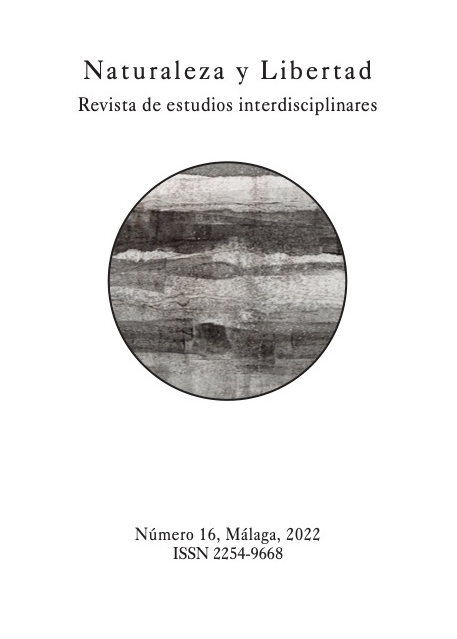The Gnoseologic Principles of Bertrand Russell
DOI:
https://doi.org/10.24310/NATyLIB.2022.vi16.12383Keywords:
Russell, gnoseology, knowledge, scienceAbstract
Exposed in 1948, within his masterpiece on the scope and limits of human knowledge, the epistemological tenets that Bertrand Russell regarded as fundamental elements in the construction of scientific knowledge, are still worthy of a detailed discussion today. Throughout this article, these principles will be subjected to an orderly analysis from the perspective of the scientific advances that have occurred since then. Given the excellence of the author, it will not be surprising to see that Russell's gnoseologic postulates address some of the most controversial questions, still to be solved, in the theory of knowledge
Downloads
Metrics
References
M. Bishop, J. Trout, Epistemology and the Psychology of Human Judgment, Oxford – New York, Oxford University Press, 2005
M. Black, “Induction”, en: Paul Edwards (ed.), The Encyclopedia of Philosophy (vol. 4), New York, Macmillan, 1967: 169-181
R. Boyd, J. B. Silk, How Humans Evolved, New York, Norton & Company, 2000
M. Bradie, “Assessing Evolutionary Epistemology”, Biology and Philosophy, 1986 (1): 401-59
M. Bunge, Controversias en física, Madrid, Tecnos, 1983
R. Burian, The Epistemology of Development, Evolution, and Genetics, Cambridge – New York, Cambridge University Press, 2005
R. Clark, Russell, Barcelona, Salvat, 1984
A. Cournot, Exposition de la théorie des chances et des probabilités, Paris, Hachette, 1843.
A. Dieguez, “Realismo y epistemología evolucionista de los mecanismos cognitivos”, Crítica, 2002 (34/102): 3-28
B. de Finetii, “Funzione caratteristica di un fenómeno aleatorio”, en: Memoríe delia Reale Accademia dei Lincei, 1930 (IV/5): 86-133
B. de Finetii, “Sul signifícato soggettivo della probabilità”, en: Fundamenta Mathematicae, 1931 (17): 298-329.
M. Friedman, Fundamentos de las teorías del espacio-tiempo, Madrid, Alianza, 1991
K. Gödel, “La lógica matemática de Russell”, en: Teorema, 2006 (XXV/2): 113-137
A. H. Goldman, Epistemology and Cognition, Cambridge (Mass.), Harvard University Press, 1986
N. Griffin (ed.), The Cambridge Companion to Bertrand Russell, Cambridge – New York, Cambridge University Press, 2003
Y. Guttmann, The Concept of Probability in Statistical Physics, Cambridge – New York, Cambridge University Press, 1999
T. Horowitz, The epistemology of a priori knowledge, Oxford – New York, Oxford University Press, 2006
J. M. Keynes, A Treatise on Probability, London, Macmillan, 1921
S. Mithen, The Prehistory of the Mind, London, Thames and Hudson, 1996
R. von Mises, Wahrscheinlichkeit, Statistik und Wahrheit, Wien, Springer, 1928
R. von Mises, Wahrscheinlichkeitsrechnung und ihre Anwendung in der Statistik und theoretischen Physik, Leipzig, Detuicke, 1931
K. Popper, “The propensity interpretation of the calculus of probability and the quantum theory”, en: Stephan Korner (ed.), Observation and Interpretation. A Symposium of Philosophers and Physicists. Proceedings of the Ninth Symposium of the Colston Research Society held in the University of Bristol (April 1st ? April 4th), London, Butterworth, 1957: 65-70.
F. Ramsey, The Foundations of Mathematics and Other logical Essays, London, Routledge and Kegan Paul, 1931.
R. Riedl, Biologia del Conocimiento. Los fundamentos filogenéticos de la razón, Barcelona, Labor, 1983
A. Robb, The absolute relations of time and space, Cambridge (U.K.), Cambridge University Press, 1921
A. Robb, Geometry Of Time And Space, Cambridge (U.K.), Cambridge University Press (Cambridge), 1936
B. Russell, Investigación sobre el significado y la verdad, Buenos Aires, Losada, 1946a
B. Russell, Nuestro conocimiento del mundo externo, Buenos Aires, Losada, 1946b
B. Russell, La evolución de mi pensamiento filosófico, Madrid, Alianza, 1982
B. Russell, El Conocimiento Humano, Barcelona, Orbis, 1983
E. Sosa, A Virtue Epistemology, Oxford – New York, Oxford University Press, 2007
Downloads
Published
How to Cite
Issue
Section
License
Those authors who have publications with this journal, accept the following terms:
1. Copyright and licensing information are clearly described on the journal’s web site: all content published in Naturaleza y Libertad is open acces without limit, and are subject to the Attribution-NonCommercial-ShareAlike 4.0 International (CC BY-NC-SA 4.0) license. The full text of which can be consulted at https://creativecommons.org/licenses/by-nc-sa/4.0/
2. It is the responsibility of the authors to obtain the necessary permissions for the images that are subject to copyright. The authors whose contributions are accepted for publication in this journal will retain the non-exclusive right to use their contributions for academic, research and educational purposes, including self-archiving or deposit in open access repositories of any kind. The electronic edition of this magazine is edited by the Editorial de la University of Malaga (UmaEditorial), being necessary to cite the origin in any partial or total reproduction.
3. This journal allows and encourages authors to publish papers on their personal websites or in institutional repositories, both before and after their publication in this journal, as long as they provide bibliographic information that accredits, if applicable, your posting on it.
4. In no case will anonymous papers be published.





18.png)













